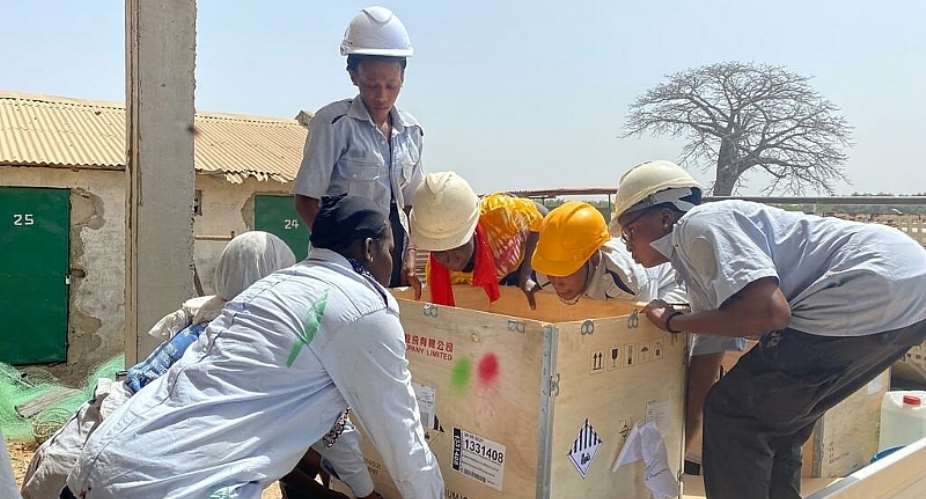Former Gambian high school dropout Fatou Njie thought fish would be in her future, but not in the way she sees them now.
“I started selling fish at Tanjai beach,” she says, adding that she initially wanted to finish school and go on to university, but lacked the funds and the grades to go further.
One of the places she would stop by to gather firewood was Fandema, a women's development centre that provides vocational training for uneducated women and girls who dropped out of school.
“I saw older women learning solar installation and other skills there,” says Njie.
“I made inquiries and I was lucky to be enrolled in 2013.”
The former fish seller has jumped from solar panel installation student to trainer, one of 20 young women who are now employed as trainers.
Njie is leading a team of 16 girls to work on a solar ice maker for fish sellers in Kartong to keep their fish fresh.
Helping young women help themselves
Fandema, or self-help in Mandinka, is a community-based project by Mbolo Association to provide skills and education to women and young girls in fields that are normally seen as male-dominated.
Project coordinator Malang Sambou said he was motivated to start this project because he came from a family where priority was given to male education.
“My mother – the first child, didn't go to school, but all her brothers my uncles went to school," Sambou says. "That's why our main target is to bring education to these women."
The group targets young women who dropped out of school, a problem that affects more than 50 percent of the Gambian female population.
- Gambian government's Ramadan declaration angers feminists
- Gambia's Gina Bass, the 'poor Olympian' sprinter, goes for the gold in Tokyo
The Gambia fact-sheet 2020 states that 55 percent of girls dropped out of school before or while in high school.
The Gambia's Basic and Secondary Education Ministry data indicates that the number has slightly decreased, due to Covid-19.
Some young women, like Jama Ceesay who were forced to stay home because of the pandemic have tapped into new opportunities. She is one of the 16 students presently enrolled at Fandema.
“My dad told me about Fandema. Each community sends two people to be trained at the center, but for my community, I was the only one chosen and back home,” she says.
“Everyone is relying on me to use the skills learned here to help them, and thankfully now I can fix any solar panel installation,” Ceesay tells Africa Calling podcast.
Improving the lives of other women, too
One of the biggest fishing and oyster harvesting sites, Kartong attracts women from all over The Gambia. These women supply fish to other parts of the country, such as Basse and Jarra Soma, but lack ice blocks to store their fish safely.
“We can't wait for the ice processing centre to be completed because we don't have electricity here and Fandema brought solar power to us,” says fish seller Isatou Jabang.
“We've been waiting a long time for this and we need it as quickly as possible because most of the time when we don't have ice blocks, our fish spoils,” she says.
This year's International Women's month theme is breaking bias.
The Fandema students are hoping to inspire more young women to start careers in professions not popular in The Gambia.
This story was first heard on RFI's Africa Calling podcast.





 Beige-bank trial: Beige Bank disobeyed BoG — Prosecution
Beige-bank trial: Beige Bank disobeyed BoG — Prosecution
 NACOC staff arrested over cocaine smuggling
NACOC staff arrested over cocaine smuggling
 Controller and Accountant General resigns
Controller and Accountant General resigns
 Election 2024: Mute voices of politicians with 'sharp tongue' — Security Expert ...
Election 2024: Mute voices of politicians with 'sharp tongue' — Security Expert ...
 NDC opts out of Ejisu by-election
NDC opts out of Ejisu by-election
 Recommissioning of Ameri Power Plant an indication of clueless govt – NDC
Recommissioning of Ameri Power Plant an indication of clueless govt – NDC
 Love text message exposes pedophile
Love text message exposes pedophile
 Palm wine tapper kills wife over infidelity at Bogoso
Palm wine tapper kills wife over infidelity at Bogoso
 Dome Kwabenya: Mike Ocquaye washes woman panties for votes
Dome Kwabenya: Mike Ocquaye washes woman panties for votes
 MASLOC former boss sentenced to 10 years in prison with hard labour
MASLOC former boss sentenced to 10 years in prison with hard labour
